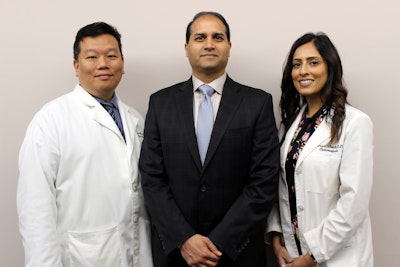
Retinal Disorders
Retinal disorders can cause ordinary tasks to become overwhelming, if not impossible. However, there are effective treatments available.
Retinal disorders affect the tissue within the eye that allows you to see images clearly. Untreated, retinal disorders can cause blindness.
So, what are some common symptoms of retinal disorders?

Signs You May Suffer from a Retinal Disorder
Noticeable Floaters
Floaters, fibers within the eye which are often shaped like cobwebs, specks, or strands, are a common occurrence. However, a sudden increase in quantity and size of these fibers may be indicative of a retinal disorder.
Visual Distortions
A variety of visual distortions may indicate a retinal disease. These include flashers, lines that should be straight appearing wavy, changes in color perception, as well as increasing issues with night blindness.
Partial Loss of Vision
Several retinal diseases can lead to partial vision loss. This can include continuous blurring which causes blind spots in your central field of vision or loss of peripheral vision. You should notify your doctor of any symptoms.
Are You High-Risk? The Role of Genetics, Lifestyle, and Your Health
While there are many elements that may contribute to the likelihood of developing a retinal disorder, there are several key indicators that have been tied to retinal diseases including:
- Diabetes
- Smoking
- High blood pressure
- Obesity
- Dietary habits
- Cardiovascular disease
- Age
- Exposure to UV rays
A family history of certain conditions is typically considered to be the most significant indicator of risk for retinal diseases.
So, what happens in the eye to cause a retinal disorder?
Common Causes of Retinal Disorders
Leaking Fluid
With conditions such as diabetic retinopathy or wet AMD, fluid may leak from the blood vessels in the eye. If you have suffered retinal detachment, fluid can leak behind the retina through a tear. This can cause the retina to swell or damage cells, causing loss of vision.
Abnormal Pulling on the Retina
In cases of retinal tear or macular pucker, tissue can pull on the retina due to shrinking of the vitreous or the development of an epiretinal membrane. The tension placed on the retina can distort your vision. If you have a retinal tear, you may also experience flashers and floaters.
Deterioration of the Retina
If you have macular degeneration or retinitis pigmentosa, your vision impairment may be caused by deterioration of the photoreceptors, the cells within the retina that interpret light. When photoreceptors begin to deteriorate, your ability to see detail and definition, such as color perception and night vision, are negatively impacted.
"Many retina problems, if detected early, can be reversed." Retina Specialist, Dr. Lauren Kallina
There are a Variety of Proven Methods Available to Slow or Halt the Progression of Retinal Disorders
Control Health Conditions
If you have diabetes, are obese, or suffer from another health condition that can contribute to the risk of developing a retinal disorder, it is essential that you proactively control your condition.
Change Habits That Heighten Your Risk
Adjust your dietary habits and integrate foods that promote eye health. These include leafy greens, egg yolks, and foods rich in omega-3. Eliminating foods that are not good for eye health and quitting smoking can also lower your risk of developing a retinal disease.
Attend Your Regularly Scheduled Eye Exams
During eye exams, your doctor is able to evaluate the health of your eye and identify if there are any signs of retinal disease. If your doctor is able to catch a disorder early on, they can more effectively help you prevent further vision loss and restore clarity.
Your Doctor can Evaluate Your Eye Health & Identify Signs of Retinal Disease
The doctor can conduct a variety of tests to evaluate for signs of abnormalities within the eye. These in-depth examinations allow the doctor to determine the location and severity of your condition. Your eye exam may include an Amsler grid test to evaluate the clarity of your central vision, optical coherence tomography (OCT) for up-close imaging of the retina, fluorescein angiography to evaluate blood vessels, as well as other diagnostic tests to identify injuries and other concerns.
/https://d3b3by4navws1f.cloudfront.net/shutterstock_384137371.jpg)
This patient is undergoing diagnostic testing to evaluate her retinal health.
In addition to formal tests, the doctor will also typically discuss your medical history, eye conditions that run in your family, any changes that you have been experiencing in your vision, as well as how these changes are affecting your daily life. This information will play a valuable role in planning effective treatment.
Depending on the Extent of Your Retinal Disorder, Several Treatment Options may be Available to You
Laser Vision Correction
Laser surgery may be utilized to repair a retinal tear as well as shrink abnormal or leaking blood vessels. This can help prevent future vision loss.
Injection of Medication
Injecting medication into the eye may be an effective solution for patients with wet macular degeneration or diabetic retinopathy. This treatment can prevent new blood vessels from forming.
Vitrectomy
Vitrectomy is a procedure during which the vitreous, or gel-like fluid within the eye, is removed and replaced with a saline solution so that the doctor can remove scar tissue or make repairs. This procedure is often performed to treat several conditions including macular hole, diabetic retinopathy, macular pucker, and retinal detachment.
Scleral Buckling
Scleral buckling is a common treatment for retinal detachment in which silicone material is used to relieve some of the tension on the retina. This treatment is often combined with other treatments such as laser surgery.
Contact Your Doctor
Diagnosing your condition is the first step to a better quality of life. Your doctor can determine the source of your vision loss and help you prevent further impairment. Contact your physician to schedule an examination as soon as possible.


